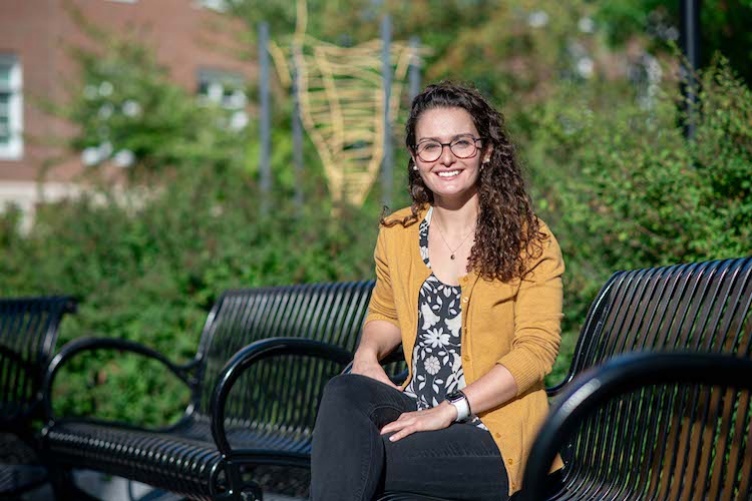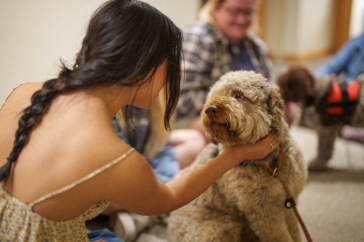
Alexandra Papadakis ’21 has long been interested in food. When she started at UNH, she thought that interest would take her in the direction of how it’s grown, harvested, marketed, consumed— that kind of thing. So she majored in sustainable agriculture and food systems, adding the dual major ecogastronomy. Then she started thinking more about hunger.
In 2018, during the summer following her freshman, Papadakis participated in the Hamel Center’s Research Experience and Apprenticeship Program (REAP), designed for first-year honor students. Her goal was to get a better handle on food systems through research. Working with Joanne Burke of the agriculture, nutrition, and food systems department, Papadakis investigated “various aspects of New Hampshire’s food system to understand what goes on from farm-to-fork and to think through potential opportunities that exist to improve food system viability in the state.”
"It seemed to me that an unacceptable number of people in our New Hampshire towns and communities didn't know where their next meal would come from or were having to make the difficult decision whether to pay rent or to buy groceries."
“I worked with a middle school farm‐to‐school education program, surveyed farmers and consumers and volunteered with an organization called NH Gleans,” the North Hampton, New Hampshire, resident says. “By the end of the summer, I witnessed how education can influence students’ knowledge about food, explored the feasibility of establishing a food hub in the Seacoast area, and learned how gleaning can assist food assistance providers in supplying fresh produce to those in need.”
The following spring, Papadakis signed on with UNH’s Semester in the City to do an internship in Boston, working in the public policy department at the anti-hunger organization Project Bread.
During the 14- week term, she created a guide for Massachusetts legislators offering policy recommendations to fight hunger in their districts and helped connect Project Bread’s action team with opportunities to advocate for policy change.
It was after those experiences that Papadakis changed her major to nutrition and dietetics and ecogastronomy, with a minor in sustainable agriculture.
“I switched because I became more interested in the field of community nutrition as it relates to hunger and food insecurity, and a nutrition/dietetics degree seemed to better fit that interest,” Papadakis says. “But sustainable agriculture is big part of food systems being viable, which is why I still wanted to keep it as a minor.”
“Doing the research for my REAP project, I noticed how close to home the issue of food insecurity was. It seemed to me that an unacceptable number of people in our New Hampshire towns and communities didn't know where their next meal would come from or were having to make the difficult decision whether to pay rent or to buy groceries,” Papadakis says. “Working at Project Bread only reinforced my drive to want to make positive change toward making sure hunger isn't a problem that persists in our communities long-term.”
She also mentions the impact the Semester in the City method of learning has had on steering her future, noting the experience challenged her conventional view of education: attending a class, taking notes, having that knowledge tested on an exam.
“Instead, I gained practical experience in my field and learned about taking my career one step further and what it could look like to direct social change,” says Papadakis, who returned to Project Bread this summer as the nonprofit’s public policy communications intern.
Her goal is to get involved with community nutrition, particularly in the area of food insecurity and hunger, and she plans to explore those issues in her senior honors thesis in nutrition and her senior capstone in ecogastronomy.
“My thesis is going to be a survey of the intersection between race and hunger, and then my capstone project will look at the issue of food insecurity in New Hampshire refugee communities,” she says.
Graduate school is likely as are dietetic internships, needed to become a registered dietitian. Papadakis also is considering applying for a Bill Emerson National Hunger Fellowship or Samuel Huntington Public Service Award.
As if a dual major, a minor, internships and research aren’t enough, Papadakis is a past member of Slow Food UNH and the UNH Organic Gardening Club, serving for two years as the organizer of that group’s community dinner. She also works at Campus Recreation as a building manager and program assistant for both the fitness and informal recreation programs. In 2019 she studied abroad in Ascoli Piceno, Italy.
Back on campus this semester after going remote because of COVID-19, four of her five classes are taught in person, some with hybrid capabilities, an aspect she praises along with efforts the university has made to have face-to-face learning.
“I am really impressed by what the administration, faculty and staff alike have done to make the learning environment as safe as possible,” Papadakis says. “It’s certainly an adjustment, but the little changes like wearing a mask and spacing out our desks farther than usual are sacrifices I’m willing to make in order to be with my classmates and teachers again. My favorite part about class and learning is always the hands-on work, which is something that I’m glad we’ve been able to retain.”
-
Written By:
Jody Record ’95 | Communications and Public Affairs | jody.record@unh.edu
















































